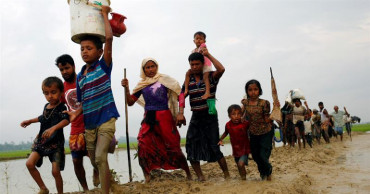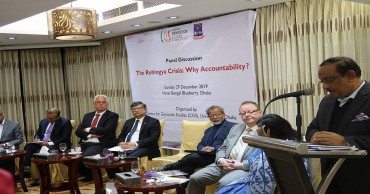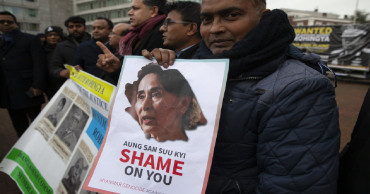UN court
Ukraine brands Russia ‘terrorist state’ to open hearings in case against Russia at top UN court
A top Ukrainian diplomat called Russia a "terrorist state" Tuesday as he opened his country's case against Moscow at the United Nations' highest court and accused Russia of blowing up a major dam in southern Ukraine.
Anton Korynevych was addressing judges at the International Court of Justice in a case brought by Kyiv against Russia linked to Moscow's 2014 annexation of Crimea and arming of rebels in eastern Ukraine in the years before Russia's full-scale invasion in February 2022.
Ukraine wants the world court to order Moscow to pay reparations for attacks in the regions, including for the downing of Malaysia Airlines flight MH17 that was shot down by Russia-backed rebels on July 17, 2014, killing all 298 passengers and crew.
ALso Read: Ukraine accuses Russia of destroying major dam near Kherson, warns of ecological disaster
Korynevych said that with Moscow unable to beat Ukraine on the battlefield, "it targets civilian infrastructure to try to freeze us into submission. Earlier today, just today, … Russia blew up a major dam located in Nova Kakhovka, causing significant civilians evacuations, harsh ecological damages and threatening the safety of the Zaporizhzhia nuclear power plant. Russia's actions are the actions of a terrorist state, an aggressor."
Four days of hearings in the court's ornate, wood-paneled Great Hall of Justice are opening against a backdrop of Europe's deadliest conflict since World War II. Ukraine and Russia are trading accusations of blame for the damage to the Kakhovka dam and hydroelectric power station, which are located in a part of Ukraine that Moscow controls.
Meanwhile, in The Hague, lawyers for Kyiv were presenting legal arguments to support their case Tuesday, followed by Russia on Thursday. Each side has another opportunity next week to present evidence. Judges are expected to take months to issue a judgment.
"The Russian Federation has contempt for international law," Korynevych said. "Over the last 16 months, the world has woken up to this dark reality."
The case is one of several legal proceedings against Russia linked to Ukraine.
Also Read: Russia launched 'largest drone attack' on Ukrainian capital before Kyiv Day; 1 killed
In a separate case brought by Ukraine in the immediate aftermath of Russia's illegal invasion, the world court issued a preliminary order calling on Russia to stop hostilities — a legally binding ruling that Moscow ignored.
In that case, Kyiv is arguing that Russia violated the 1948 Genocide Convention by falsely accusing Ukraine of committing genocide and using that as a pretext for the Feb. 24, 2022, invasion. Moscow argues that the court does not have jurisdiction.
A few kilometers (miles) away at the International Criminal Court, judges have issued an arrest warrant for Russian President Vladimir Putin on charges of deporting and illegally transferring children from Ukraine. Russia is not a member of the court and does not recognize its jurisdiction.
Meanwhile, a Dutch domestic court last year convicted two Russians and a pro-Moscow Ukrainian for their roles in downing MH17 and sentenced them in their absence to life imprisonment. Ukraine also has another case against Russia at the International Court of Justice over its invasion last year, and the Netherlands and Ukraine are suing Moscow at the European Court of Human Rights over MH17.
Also Read: Russia says drones damage Moscow buildings in pre-dawn attack, blames Ukraine
Russia has always denied involvement in the downing of the passenger jet that was flying from Amsterdam to Kuala Lumpur when it was shot down by a Soviet-era missile over eastern Ukraine.
Tuesday's hearing is in a case Kyiv brought in 2017 related to Russia arming rebels in eastern Ukraine and restricting the rights of ethnic Tatars and other minorities following its annexation of Crimea in 2014.
In a preliminary ruling, the court ordered Russia to stop limiting "the ability of the Crimean Tatar community to conserve its representative institutions."
2 years ago
UN court to rule on jurisdiction in Rohingya genocide case
The United Nations' highest court is ruling Friday on whether to proceed with a landmark case that accuses Myanmar's rulers of genocide against the country's mainly Muslim Rohingya minority.
The International Court of Justice is set to deliver its decision on Myanmar's claims that the Hague-based court does not have jurisdiction and that the case filed by the tiny African nation of Gambia in 2019 is inadmissible.
If judges reject Myanmar's objections, they will set the stage for court hearings airing evidence of atrocities against the Rohingya that rights groups and a U.N. probe say amount to breaches of the 1948 Genocide Convention. In March, U.S. Secretary of State Antony Blinken said that violent repression of the Rohingya population in Myanmar amounts to genocide.
Amid international outrage at the treatment of the Rohingya, Gambia filed the case with the world court alleging that Myanmar is breaching the genocide convention. The nation argued that both Gambia and Myanmar are parties to the convention and that all signatories have a duty to ensure it is enforced.
Also read: Dhaka urges Jakarta to do more for repatriation of Rohingya refugees
Lawyers representing Myanmar argued in February that the case should be tossed out because the world court only hears cases between states and the Rohingya complaint was brought by Gambia on behalf of the Organization of Islamic Cooperation.
They also claimed that Gambia could not bring the case to court as it was not directly linked to the events in Myanmar and that a legal dispute did not exist between the two countries before the case was filed.
Gambia’s Attorney General and Justice Minister Dawda Jallow insisted in February that the case should go ahead and that it was brought by his country, not the OIC.
“We are no one’s proxy,” Jallow told the court.
The Netherlands and Canada are backing Gambia, saying in 2020 that the country “took a laudable step towards ending impunity for those committing atrocities in Myanmar and upholding this pledge. Canada and the Netherlands consider it our obligation to support these efforts which are of concern to all of humanity.”
Myanmar’s military launched what it called a clearance campaign in Rakhine state in 2017 in the aftermath of an attack by a Rohingya insurgent group. More than 700,000 Rohingya fled into neighboring Bangladesh and Myanmar security forces have been accused of mass rapes, killings and torching thousands of homes.
Also read: Rohingya Repatriation: Dhaka seeks proactive role from Indonesia, ASEAN
In 2019, lawyers representing Gambia at the ICJ outlined their allegations of genocide by showing judges maps, satellite images and graphic photos of the military campaign. That led the court to order Myanmar to do all it can to prevent genocide against the Rohingya. The interim ruling was intended to protect the minority while the case is decided in The Hague, a process likely to take years.
The ICJ case was complicated by last year's military coup in Myanmar. The decision to allow the Southeast Asian nation's military-installed government to represent the country at the February hearings drew sharp criticism. A shadow administration known as the National Unity Government made up of representatives including elected lawmakers who were prevented from taking their seats by the 2021 military coup had argued that it should be representing Myanmar in court.
The International Court of Justice rules on disputes between states. It is not linked to the International Criminal Court, also based in The Hague, which holds individuals accountable for atrocities. Prosecutors at the ICC are investigating crimes committed against the Rohingya who were forced to flee to Bangladesh.
3 years ago
UN court to open hearings in Rohingya genocide case
Myanmar’s shadow civilian administration called on the United Nations’ top court Monday not to allow the country’s military rulers to represent the Southeast Asian nation at hearings into a case accusing the country of genocide against the Rohingya ethnic minority.
Four days of hearings into the Myanmar military’s deadly 2017 crackdown on the Rohingya are scheduled to open Monday afternoon at the International Court of Justice amid a dispute over who should represent the country in court.
Representatives of Myanmar are scheduled to address judges to outline why they believe the case that was filed by the African nation of Gambia, representing a group of Muslim nations, should be dropped.
Read:Argentinian judiciary to open case against Myanmar military over Rohingya genocide
But members of Myanmar’s National Unity Government, urged the court not to accept representatives of the military rulers.
“We do not believe that the International Court of Justice will want to allow the military to appear before them as if they speak for the Republic of the Union of Myanmar,” said the unity government’s foreign minister, Zin Mar Aung. “It would be a most profound injustice to the Rohingya if the military were to be both their abusers and have any voice in the court.”
The shadow administration said it has contacted the court to withdraw Myanmar’s preliminary objections to the case, but it remains to be seen whether the court will recognize the unity administration.
The shadow administration is made up of a diverse group of representatives including elected lawmakers who were prevented from taking their seats by the military takeover. It says it is the country’s only legitimate government but no foreign government has recognized the unity group.
The dispute at the world court in The Hague reflects a broader struggle in the international community over whom to accept as Myanmar’s legitimate rulers in the aftermath of the coup.
Southeast Asian foreign ministers held their annual retreat last week without their counterpart from Myanmar, who was blackballed from participating but allowed to attend online as an observer.
The military launched what it called a clearance campaign in Rakhine state in 2017 after an attack by a Rohingya insurgent group. More than 700,000 Rohingya fled into neighboring Bangladesh and security forces were accused of mass rapes, killings and torching thousands of homes.
In 2019, lawyers representing Gambia at the ICJ outlined their allegations of genocide by showing judges maps, satellite images and graphic photos of the military campaign. That led the court to order Myanmar to do all it can to prevent genocide against the Rohingya. The interim ruling was intended to protect the minority while the case is decided in The Hague, a process likely to take years.
Read: Rohingya genocide continues after Myanmar military coup: BROUK
Former pro-democracy icon Aung San Suu Kyi represented Myanmar at the 2019 hearings, but she now is imprisoned after being convicted on what supporters call trumped-up charges.
Last year’s military takeover in Myanmar sparked widespread peaceful protests and civil disobedience that security forces suppressed with lethal force. About 1,500 civilians have been killed, according to the Assistance Association for Political Prisoners.
Akila Radhakrishnan, president of the Global Justice Center, said this week’s International Court of Justice hearings “are laying the groundwork for accountability in Myanmar — not only for the Rohingya, but for all others who have suffered at the hands of the military.”
The International Court of Justice rules on state responsibility for breaches of international law. It is not linked to the International Criminal Court, also based in The Hague, which holds individuals accountable for atrocities. Prosecutors at the ICC are investigating crimes committed against the Rohingya who were forced to flee to Bangladesh but have not yet filed any indictments.
4 years ago
UN welcomes ICJ order; trusts Myanmar will duly comply with it
Welcoming the order of the top UN court, Secretary General Antonio Guterres has said he trusts that Myanmar will duly comply with the court’s order.
6 years ago
Experts seek stronger global pressure to ensure justice for Rohingyas
Speakers at a discussion here on Sunday laid emphasis on strengthening joint global efforts on accountability front mentioning that the recent hearing at the top UN court in The Hague offers both challenges and opportunity for the international community to get involved deeply and ensure justice for Rohingyas.
6 years ago
Suu Kyi denies Myanmar genocide allegations at top UN court
Myanmar's former pro-democracy icon Aung San Suu Kyi on Wednesday denied that her country's armed forces committed genocide against the Rohingya minority, telling the U.N.'s top court that the exodus of hundreds of thousands of Muslims was the unfortunate result of a battle with insurgents.
6 years ago

.jpg)







